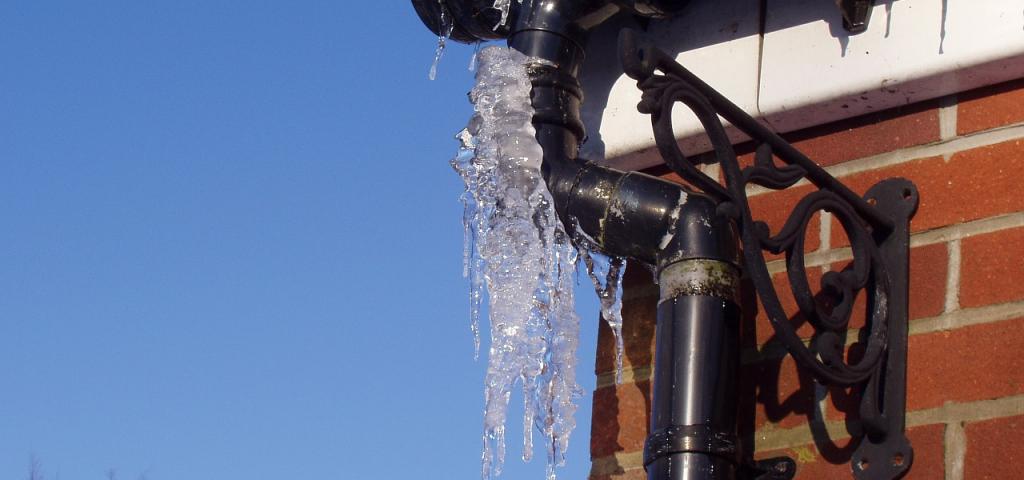With the winter months closing in, it’s time to start thinking about the integrity of your plumbing system, especially if you’re planning to spend some time away from home. As temperatures plummet, your water supply can begin to freeze, limiting your flow and causing significant damage to your pipes. So as plumbers in Bristol and South Gloucestershire begin to gear up for a busy season, now is the perfect time to track down any at-risk pipes, and protect yourself against mid-winter mayhem.
What’s the Big Problem?
One of the first signs that your pipes may be freezing is reduced water flow into your household. This alone can be a huge inconvenience, reducing the pressure of showers and faucets, and making it harder to access running water when you need it.
However, the situation can rapidly deteriorate, as freezing not only blocks your pipes, but puts them at risk of cracking, bursting, or separating. This is largely because water expands as it freezes, gradually forcing pipes apart, and increasing tension on their joints. This can be further exacerbated by the fact that the pipes themselves may contract with the cold, reducing their capacity and causing sections to shrink away from each other.
Costly Repairs
The damage resulting from a burst pipe extends beyond simply replacing the pipe itself. For a start, you will need to carry out a full inspection of your plumbing system in case other sections have become cracked, weakened, or deformed.
Worse still, if the damage is not detected before the water thaws, you could be faced with a hefty water bill, and the possibility of flooding. Depending on the location of the broken pipe, this might mean anything from a wet basement, to extensive water damage throughout your home.
The Association of British Insurers states that, during colder winters, daily burst pipe claims have numbered in the thousands, with damages averaging between £6,500 and £7,500. Unfortunately, if you are deemed to have failed to properly maintain your plumbing system, there’s a chance your claim might not be accepted.
Thawing a Frozen Pipe
Despite the obvious concerns, if you discover a frozen pipe, all is not lost. It is possible to thaw it out, and get your water supply moving again. However, it is vital to do this slowly and carefully, as applying too much heat too quickly can cause pipes to crack.
Before you start, you should identify the faucet served by the frozen pipe, and turn it on. The chances are that the water will be running very slowly, if at all. Nevertheless, as the ice begins to melt, it will run through the open faucet, helping the pipe to clear.
Before you begin warming the pipe, turn off your water supply at the main stopcock. This prevents any unnecessary water loss. Once you’re ready, slowly thaw the pipe by applying towels soaked in hot water, starting at the point nearest the tap. You can also use hot water bottles, or even a hairdryer on its lowest setting, providing there is no flooding or build-up of water around the pipe or power outlet. Do not attempt to thaw pipes using any form of blow lamp or naked flame.
Take your time, and work carefully, keeping an eye out for any leaks or signs of damage to your pipes, and don’t forget to turn your taps off again when you are done. Finally, if you have any concerns, get in touch with a local plumber. It is always better to seek professional support than risk further damage and distress.
Prevention Is Better Than Cure
External pipes or ones located in colder rooms, such as the cellar or attic, are most likely to fall victim to harsh weather. Metal pipes are particularly vulnerable as they conduct the cold better than plastic, which makes freezing a likely occurrence.
Pipes that are only used infrequently are also at risk, due to the lack of agitation which might otherwise prevent a blockage from developing. Unfortunately, relocating or replacing sections of your plumbing system can be costly and may not be viable.
What you can do, however, is ensure that any problem pipes are insulated, with no gaps left around the valves and other fittings. Pipe lagging can be purchased at all good DIY outlets, and is easy to fit and secure. Just remember to double-check the diameter of your pipes before you buy.
A Warmer Home
The warmer your house is, the less chance there is of your water supply freezing. As such, one of the best things you can do to protect your pipes is to make sure your boiler is in good working order before winter sets in. Heat up colder rooms by leaving internal doors open, so warm air circulates throughout your entire property, and if you have a water tank, consider purchasing an insulating jacket for some added protection.
Check unused taps weekly to get the water moving and identify any warning signs, and, if you plan to go away, consider leaving your heating on low, to prevent everything freezing over in your absence. Alternatively, ask a friend or relative to keep an eye on things while you’re away.
Peace of Mind
Anyone can be caught out by plumbing problems, but these tips should help you avoid a serious disaster. Maintaining a healthy plumbing system is important all year round, so everything you do to prepare for the winter will continue to benefit you even when temperatures begin to rise in the spring.
For further advice you can visit the Met Office’s website, where you can also find notifications of incoming severe weather. Alternatively, speak to your plumber for guidance on ways to improve the health of your plumbing system, and ensure you can enjoy the winter months without having to panic about your pipes.
Plumbing
plumbers





